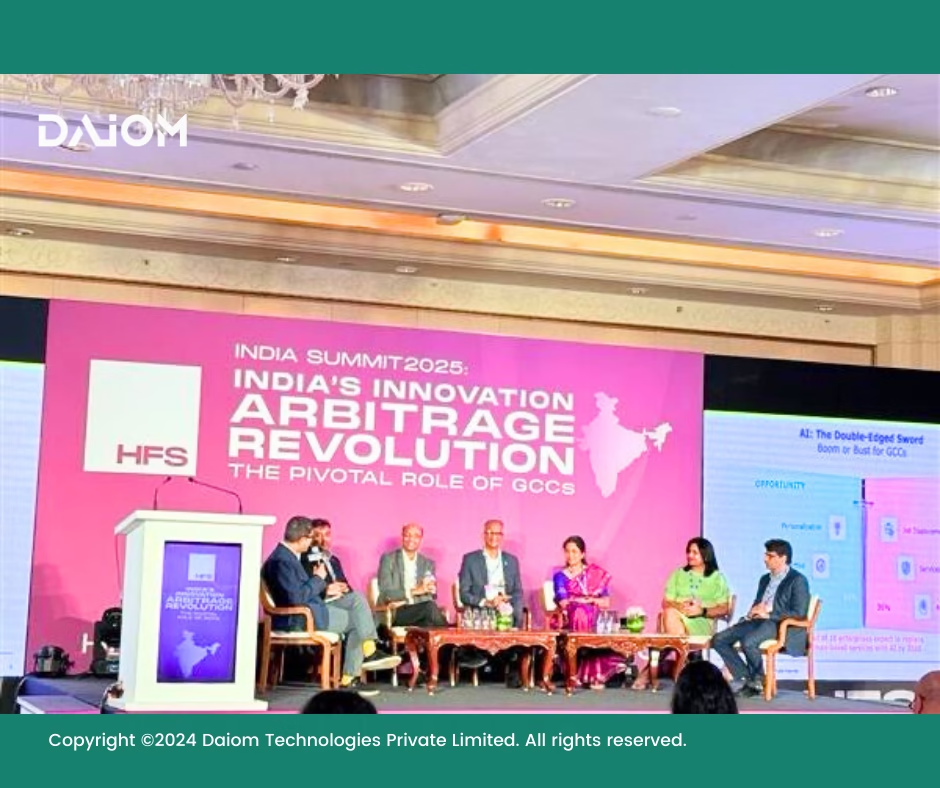At the HFS India Summit, recently, Saurabh Agrawal, the CEO of DAiOM, had the privilege of joining an engaging and thought-provoking panel discussion as a panelist led by Saurabh Gupta.
The session explored one of the most pressing questions in the IT industry today: Is Generative AI an unprecedented opportunity for IT services and Global Capability Centers (GCCs), or does it pose an existential challenge?
Having worked across IT services, GCCs, startups, and now leading my practice at DAiOM, Saurabh Agrawal shared my perspective on how AI is fundamentally altering business models, talent strategies, and industry collaborations.
The discussion brought forward diverse viewpoints, highlighting both the possibilities and disruptions that AI-driven automation and innovation bring to the industry.
Key Themes from the Discussion
The panel discussion brought out diverse perspectives on how Generative AI is reshaping the IT services and GCC landscape. While AI presents new opportunities, it also demands a shift in business models, partnerships, and talent strategies. Here are some of the most critical insights from the conversation:
1. Generative AI is Driving Rapid Experimentation Across IT Services and GCCs
Brands are increasingly integrating AI-driven solutions across customer service, experience, and marketing, with IT service providers and GCCs playing a crucial role in this transformation.
The adoption of AI is not just about automation—it is reshaping how businesses interact with customers, personalize services, and drive efficiency. Organizations that embrace this shift and experiment with AI-driven solutions will have a significant competitive advantage.
2. The Future Lies in Collaboration Between IT Services, GCCs, and Niche Players
The rise of AI does not mean the decline of IT services and GCCs; rather, it signals a fundamental shift in partnerships and service models. The traditional IT services model, focused on resource augmentation, is giving way to more productized, AI-powered solutions.
Success in this new era will depend on how well IT service providers, GCCs, and specialized AI firms collaborate to co-create value-driven solutions.
3. Being Closer to the Customer and Problem Statement is More Critical Than Ever
For AI to drive meaningful business impact, companies must deeply understand customer needs and business challenges. The most successful organizations will be those that embed AI into their operations in a way that directly addresses real-world business problems.
AI solutions that are detached from the core customer experience or fail to align with strategic objectives will struggle to create lasting value.
4. Pricing Models Must Evolve Beyond People-Based Structures
The traditional time-and-material or resource-based pricing model is becoming increasingly obsolete. AI-driven solutions demand a shift toward productized and outcome-based pricing models.
Customers are no longer paying just for hours worked; they are looking for measurable impact—whether in terms of efficiency gains, cost savings, or revenue growth. IT service providers and GCCs must realign their pricing structures to reflect this shift.
5. IT Services Firms Must Rethink Their Approach to Become AI and Product-Led
IT services companies that continue to rely on labor-intensive, project-based work risk being left behind. To stay relevant, they must pivot toward AI-first and product-led approaches.
This means investing in AI-driven platforms, automation tools, and domain-specific solutions that can scale beyond traditional service delivery. Those who fail to evolve will find themselves struggling to compete in an AI-dominated landscape.
6. Talent Strategy Will Be a Decisive Factor in the AI Era
The demand for AI-skilled professionals is soaring, and organizations must have a robust strategy to attract, upskill, and retain top AI talent. The workforce of the future will require a blend of technical expertise, business acumen, and problem-solving capabilities.
Companies that fail to invest in talent development will struggle to keep pace with the rapid evolution of AI technologies.
7. Organizations Must Be Data-Ready to Unlock AI’s Full Potential
AI is only as powerful as the data it operates on. Organizations that lack strong data infrastructure, governance, and integration will find it challenging to fully leverage AI’s capabilities.
Becoming data-ready is a prerequisite for AI success, and companies that prioritize data-driven decision-making will be best positioned to lead in the AI-powered future.
The Road Ahead for IT Services and GCCs
The debate on whether Generative AI is a boom or a bust for IT services remains ongoing. However, one thing is clear: AI is not just another technology trend—it is a transformative force that is redefining how businesses operate, compete, and deliver value.
For IT services firms and GCCs, the path forward requires bold reinvention, strategic collaborations, and a commitment to AI-led innovation. Companies that embrace this evolution with a clear focus on customer-centric AI solutions, outcome-driven business models, and talent excellence will not only survive but thrive in this new era.
The discussion at the HFS India Summit was an insightful exchange of ideas, and it was a great opportunity to engage with industry leaders and experts who are shaping the future of IT and AI.
The Future is Here—The Question is, Are We Ready?


